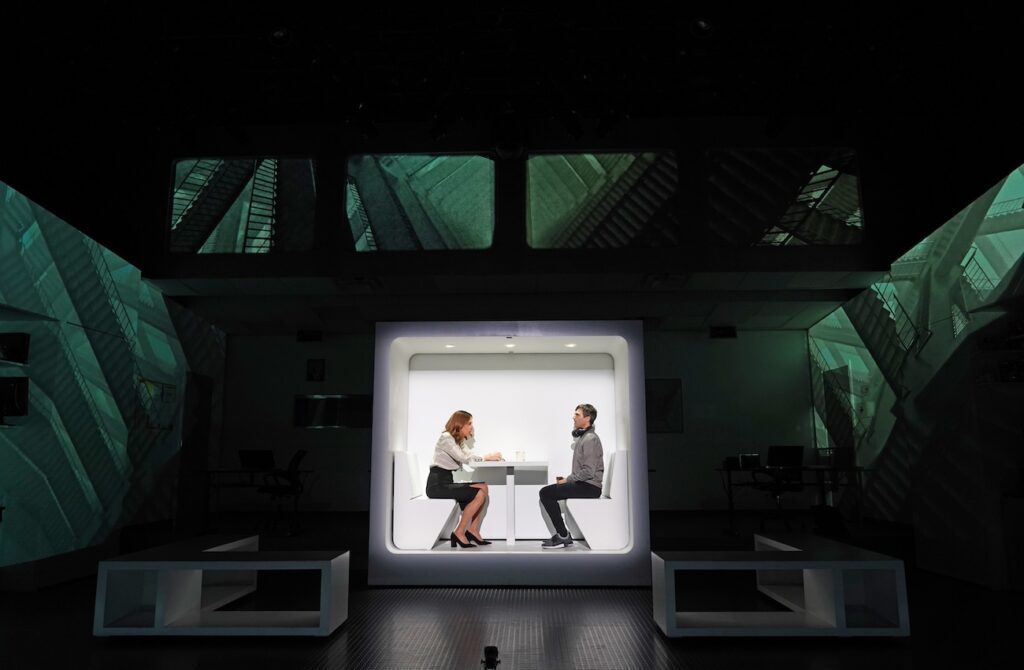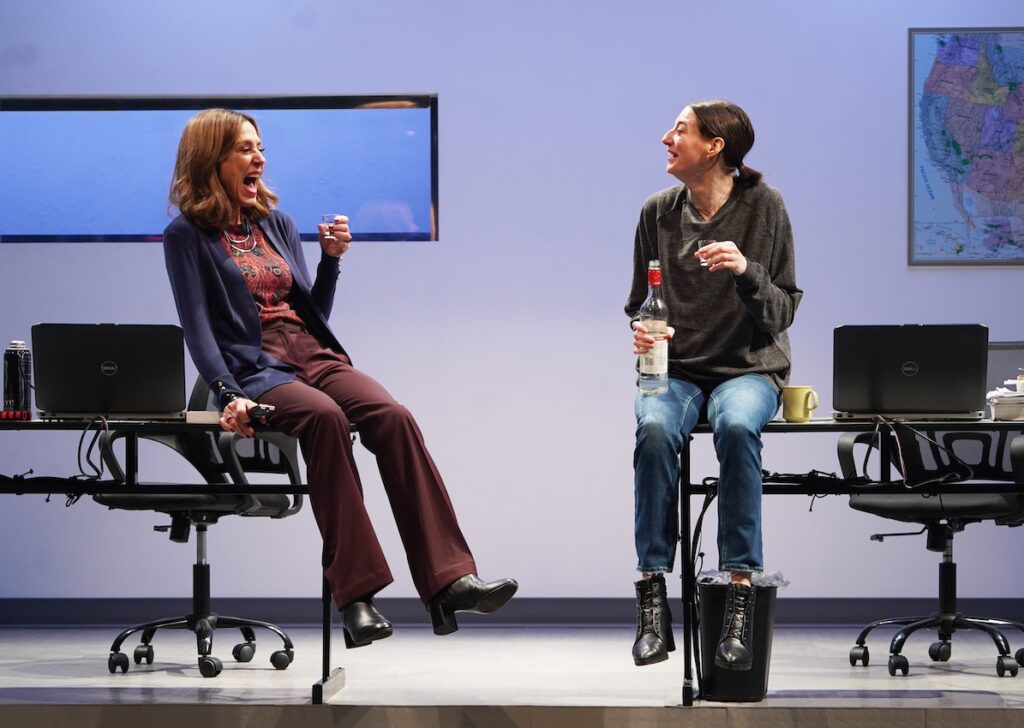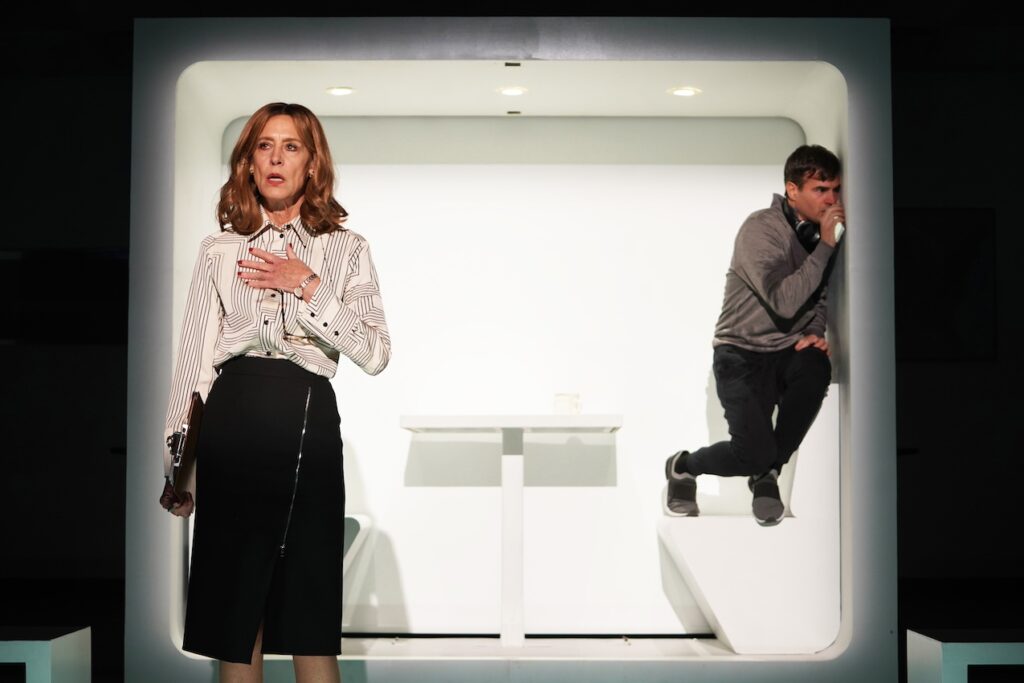Theater Review by Carole Di Tosti . . . .
In the sardonic, brilliant Russian Troll Farm, Sarah Gancher takes an imagined deep dive into the operations of one of the Russian Internet Research Agency’s numerous troll farms, operating in St. Petersburg, Russia (2014-2023). These were designed to sow discord, spread disinformation, and ultimately interfere in the 2016 U.S. presidential election. Gancher’s striking themes about our cultural penchant for becoming engaged on social media to our detriment are stark and unsettling in this acutely staged production directed by Darko Tresnjak. Playing at the Vineyard Theatre through March 3, Russian Troll Farm chillingly resonates for us today. It is a must-see.
Special Prosecutor Robert Mueller, after his investigation into Russian interference in our 2016 presidential election, indicted 13 individuals connected with the Internet Research Agency (IRA). Clearly, the Mueller report (2018) summarized that the Russians interfered to spur on the outcome of the 2016 election as a defeat for Hillary Clinton and a win for Donald Trump, an ally of President Vladimir Putin.

Gancher’s play is insightful. It is not only about the run-up to the 2016 presidential election and the Russian troll influencers, but it also explores how easily the herd instinct in human beings might be exploited by malign actors to a dangerous point of no return.
The production, which speeds briskly without an intermission, originally streamed online during the pandemic. In its premiere live, Tresnjak envisions an IRA office with the help of Alexander Dodge’s fine scenic design, enhanced by Marcus Doshi’s lighting design, and Darron L. West and Beth Lake’s sound design.
The office is a stark, sterile, white box set, with black chairs and laptops, a glass window that looks out on a hallway, and a screen upon which many real tweets from Russian trolls at the now defunct IRA are projected (Jared Mezzocchi’s video and production design).
There, the exceptional actors play out Gancher’s metaphorically cannibalizing trolls. These eventually turn on each other after manipulating the American public with inflammatory posts, crude and rude memes, broken links to articles on sites that don’t exist, misinformation, and outright lies of omission and commission.


Working together on storied memes (i.e. #tunnelkids), Masha (Renata Friedman), and Nikolai (Hadi Tabbal), fall in love as they enthusiastically smear Hillary to be a trafficker of children. The memes they create, and how they create them are reminiscent of the real #Pizzagate fiasco which brought a conspiracy theorist armed with a gun to a pizza parlor, ready to save the captured children. We note Nikolai and Masha’s process which is ironically humorous and horrible. From #Pizzagate remembrances, we understand that at the end of Masha and Nikolai’s tweets are conspiracy theorist Americans accepting, without question, that Hillary Clinton is a pedophile and trafficker of children.
As the “Queen Bee” who hires, directs, and removes her charges (i.e. Nikolai is taken away Soviet-style), the superb Christine Lahti as Ljuba oversees the productivity of tweets and posts her trolls create. More concerned with mass production than the substance of the psychological warfare stories Masha and Nikolai come up with, or Egor’s fascination with the strength of Black Americans, Ljuba is a martinet. She runs a tight ship, echoing the old USSR she aches for.
Benignly satirizing the sitcom, The Office, in the initial setup, Gancher develops her themes in four stylized segments. After the workplace comedy, which involves Nikolai and Masha’s love story over creating impactful tweets, the second segment is a Kafkaesque nightmare. This nightmare is told from the perspective of tech whiz Egor, who is at the IRA against his will. He is terrified by the IRA’s purpose and Ljuba’s coldness.
The third segment is a Shakespearean revenge tragedy, during which we learn about Steve. He is a macho, alt-right, “own the libs” lout. Steve masterminds the revenge with a techie assist by the frightened Egor. To vault himself up in the hierarchy, Steve convinces Egor to employ his tech skills in Steve’s monstrously devious plot to subvert and destroy supervisor Nikolai and hated boss Ljuba.


In the last segment (a meld of Bertolt Brecht and Annie Baker), Lahti’s Ljuba pours out her soul in a beautifully delivered monologue. She chronicles her upbringing (her parents died as traitors), against the backdrop of the USSR, and reveals her rising career as an intel agent (think Putin). Despite her miseries, rape, and pregnancy, she finds forbidden gay love. She confesses her confusion when the USSR changed to a “modern” Russia, transformed only in form, not substance.
Following each of the characters, we understand and feel for three of them. They could be Americans, but they are Russians and work as our adversaries to help elect Trump and celebrate his win as their triumph. Because we empathize with them, Gancher’s themes clarify. Underneath the memes, if we could engage in personal conversations with these individuals, we would find ourselves. However, they’ve allowed themselves to be exploited by technology to do harm. To what extent are we like them? At the end, Masha asks, “Who’s going to clean up this mess?”
Considering the upcoming presidential election in 2024, and the current Russian influence over certain GOP politicians, Masha’s question is daunting.
Russian Troll Farm. Through March 3 at The Vineyard Theatre (103 E 15th Street, between Irving Place and Union Square East). www.vineyardtheatre.org
Photos: Carol Rosegg


















